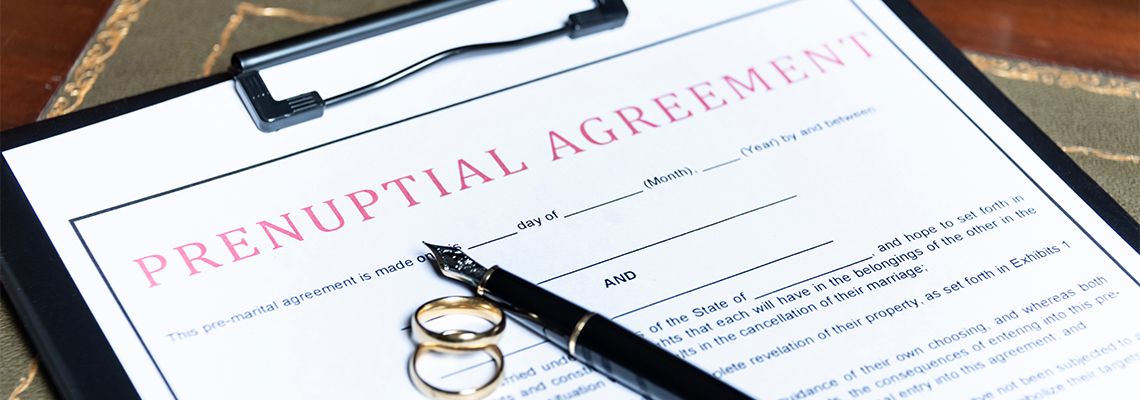Choosing adoption is often one of the most meaningful decisions a person or couple will ever make. At the same time, it can bring uncertainty, emotional highs and lows, and many unanswered questions.
Your family and your future matter. Obtain dependable legal advocacy today.

Prenuptial Agreements: What Can and Can’t Be Included?
Planning a wedding is one of the most exciting times in a couple’s life. It’s also an ideal time to have some important conversations about the future. While it may not seem romantic, talking about finances and legal protections before the big day can save you stress, time, and conflict later on. This is where a prenuptial agreement, or “prenup,” comes into play.
Prenuptial agreements are legally binding contracts that couples sign before marriage. They define how assets, debts, and other financial issues will be handled in the event of divorce, separation, or even death.
While prenups can be incredibly useful tools for financial clarity and protection, they’re not a free-for-all. Colorado law sets clear limits on what can and can’t be included in a prenup.
At Durango Family Law in Durango, Colorado, we regularly help couples draft, review, and enforce prenuptial agreements. We’ll break down what’s allowed, what isn’t, and why it’s crucial to get it right from the start.
What Is a Prenuptial Agreement?
A prenuptial agreement is a contract entered into by two individuals before they get married. It outlines how the couple will manage their financial affairs during the marriage, and how assets and debts will be divided in the event of divorce or death.
A well-drafted prenup can provide both parties with:
Clarity on financial expectations
Protection for premarital assets
Safeguards for family businesses or inheritances
A smoother, less contentious divorce if the marriage ends
In Colorado, prenups are governed by the Uniform Premarital and Marital Agreements Act (UPMAA), which became effective in 2014. This law provides a standardized set of rules to make sure prenups are fair, voluntary, and legally enforceable.
Why Consider a Prenup?
Many people mistakenly believe prenups are only for the wealthy. In reality, they’re useful for couples from all financial backgrounds. Here are a few common reasons people in Colorado seek prenuptial agreements:
One or both parties have significant assets or debts
One person owns a business or professional practice
There are children from a previous relationship
One party expects to receive a large inheritance
There’s a desire to avoid potential conflict during a divorce
A prenup is essentially an insurance policy—it doesn’t mean you expect the marriage to fail, but it does mean you’re prepared in case it does.
What Can Be Included in Prenuptial Agreements?
Let’s explore the types of provisions that are allowed under Colorado law.
Division of Property
One of the most common and important uses of a prenup is to establish how property will be divided in the event of a divorce. This includes:
Premarital property: You can specify that assets owned before the marriage remain separate property.
Marital property: You can determine how assets acquired during the marriage will be split.
Real estate holdings: You can dictate how ownership of the marital home or other properties will be handled.
Business interests: A prenup can protect a business from being divided or disrupted in a divorce.
A family attorney can help you clearly outline each of these items without leaving any room for ambiguity.
Debt Allocation
A prenup can protect one spouse from being responsible for the other’s debts—especially student loans, business debts, or credit card balances.
For example, if your fiancé has $50,000 in credit card debt, your prenup can clarify that you won’t be liable for that debt if the marriage ends.
Spousal Support (Alimony)
Prenups in Colorado can include terms regarding spousal maintenance (alimony), such as:
Waiving it entirely
Setting a specific amount or duration
Agreeing on a formula to calculate support
However, any alimony provision must be fair and reasonable at the time of enforcement, not just at the time of signing. A court may override the agreement if it results in undue hardship or violates public policy.
Inheritance and Estate Rights
You can use a prenup to waive or define inheritance rights. For example:
Waiving the right to inherit from each other
Making sure certain assets go to children from previous marriages
Clarifying how life insurance proceeds will be distributed
These provisions can be especially useful in blended families or second marriages.
Financial Responsibilities During the Marriage
A prenup can also establish how the couple will handle financial matters during the marriage, such as:
Who will pay the household bills
How joint bank accounts will be managed
Whether separate property income will remain separate
While these provisions don’t directly affect what happens in a divorce, they can help avoid confusion or conflict during the marriage itself.
Pet Ownership
Although Colorado courts treat pets as property, more couples are including provisions for pet custody or care in their prenups. While not always enforceable in the same way as financial provisions, they can serve as a guideline in the event of a dispute.
What Can’t Be Included in Prenuptial Agreements?
While prenups offer wide latitude, there are important limits. Certain provisions are unenforceable in Colorado, and including them can even invalidate parts of the agreement.
Child Custody and Child Support
Prenuptial agreements can’t include provisions about:
Who will have custody of the children
Parenting time arrangements
Child support amounts
Colorado courts always decide child-related issues based on the best interests of the child—not what the parents agreed to years earlier. The court considers current circumstances, not past contracts.
Even if you and your spouse agree on custody terms in a prenup, the court won’t be bound by those terms in a divorce proceeding.
Anything That Encourages Divorce
Provisions that financially incentivize divorce—such as one spouse receiving a lump sum payment upon divorce—are generally frowned upon and may be unenforceable.
Courts are careful to avoid provisions that could be interpreted as encouraging or rewarding the end of a marriage.
Personal or Lifestyle Clauses
You might be tempted to include “creative” terms like:
Requiring one spouse to maintain a certain appearance
Dictating how often you’ll be physically intimate
Assigning chores or household duties
Penalties for infidelity
However, these kinds of lifestyle clauses are typically not enforceable in court. Judges focus on financial and legal matters—not personal behavior.
That said, some couples still include these terms symbolically, knowing they won’t be legally binding but may serve as mutual understandings.
Unfair or Unconscionable Terms
Even if a prenup meets all formal requirements, a court may refuse to enforce it if it’s grossly unfair or leaves one spouse destitute.
For example, if a stay-at-home parent waived alimony and has no income or assets after 20 years of marriage, a judge may decide the alimony waiver is unconscionable.
The bottom line is that prenuptial agreements must be reasonable and fair, both at the time of signing and at the time of enforcement.
Legal Requirements for a Valid Prenup in Colorado
To be enforceable under Colorado law, a prenuptial agreement must meet several requirements:
Voluntary agreement: Both parties must enter the agreement freely and without pressure or coercion.
Full financial disclosure: Each party must provide a fair and reasonable disclosure of their assets, income, and debts. Hiding assets or providing incomplete information can invalidate the agreement.
In writing and signed: Verbal agreements aren’t enforceable. The prenup must be in writing and signed by both parties before the marriage.
Time to review and legal advice: It’s highly advisable—though not legally required—for both parties to have independent legal counsel. This way, each person fully understands the terms and consequences.
Signed before the wedding: The prenup must be finalized and signed before the wedding. Signing it on the wedding day or shortly before may raise questions about coercion.
A family law attorney can help you make sure your prenup adheres to all of these guidelines.
Contact an Experienced Family Law Attorney
At Durango Family Law, we help couples work through the legal and emotional components of prenuptial agreements. Based in Durango, Colorado, we serve clients in Pagosa Springs, Cortez, Dolores, Silverton, Hermosa, Hesperus, La Plata County, Montezuma County, and San Juan County.
Whether you’re protecting a business, planning for children, or simply want peace of mind, reach out to us for the guidance you need every step of the way.
RECENT POSTS
Marriage is one of the most meaningful commitments a couple can make. It’s full of hope, excitement, and long-term plans that reflect a shared future. But with that excitement often comes difficult conversations.
Grandparents often play a vital role in a child’s life, providing emotional support, stability, and family continuity. When parents face divorce, separation, or other disputes, grandparents’ involvement can become crucial. Courts may recognize that maintaining these relationships benefits the child, but decisions aren’t always straightforward.



